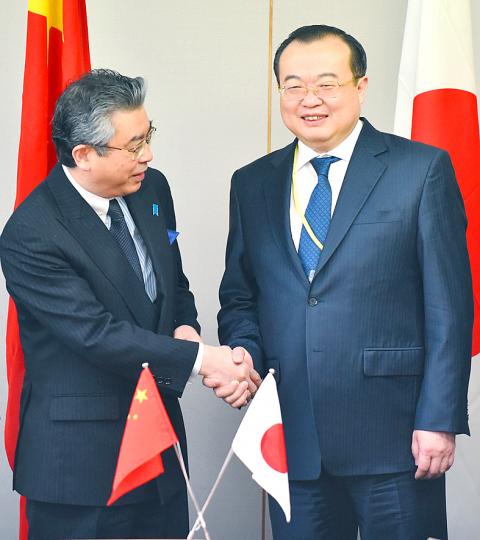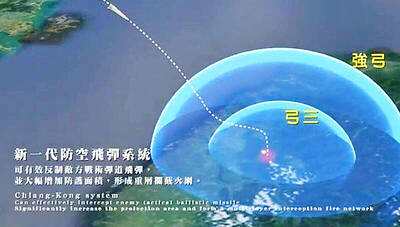Japan and China held security talks yesterday after a four-year hiatus because of simmering territorial tensions, in a meeting expected to touch on the flashpoint issue of maritime crisis management, officials and reports said.
The first such dialogue between the two Asian rivals since January 2011 was held at the Japanese Ministry of Foreign Affairs in Tokyo, a government official said, in the latest sign of a hastening thaw in once-frozen relations.
The talks involved top officials from each nation’s foreign and defense ministries, including Japanese Deputy Minister of Foreign Affairs Shinsuke Sugiyama and Chinese Assistant Minister of Foreign Affairs Liu Jianchao (劉建超).

Photo: AFP
Tokyo and Beijing are at loggerheads over the sovereignty of uninhabited islands in the East China Sea, which Japan administers as the Senkakus, but which Taiwan and China claim as the Diaoyutai Islands (釣魚台).
Relations soured in 2012 when the Japanese government angered China by nationalizing three of the five islands and Beijing had since refused most high-level talks with Tokyo, as ships and planes from both sides regularly sparred in the East China Sea.
Some observers had warned that the regular presence of military or paramilitary vessels from two of the region’s biggest powers risked sliding into conflict through error or a wayward local commander, but the two sides broke the ice in November last year when Japanese Prime Minister Shinzo Abe and Chinese President Xi Jinping (習近平) exchanged a frosty handshake on the sidelines of an APEC forum.
“Our country sees [the dialogue] as important as it is expected to improve mutual trust between Japan and China in the field of security,” Japanese Chief Cabinet Secretary Yoshihide Suga told reporters. “Through this dialogue, we want to foster a sense of trust between the two countries by exchanging views frankly and honestly on security policies, defense policies and the regional situation.”
Liu told the meeting that Beijing hoped to develop ties with Tokyo in the spirit of “taking history as a mirror and looking forward to the future,” Xinhua news agency said.
The comment reflects Beijing’s persistent theme of Japan’s need to face up to its actions in World War II.
Japan was expected to ask China to go ahead with stalled plans to launch a maritime crisis-management mechanism as soon as possible, Jiji Press said.
Tokyo is also expected to ask Beijing to make its growing defense spending more transparent and explain the reasons behind its military expansion, it said.
Beijing was likely to want to talk about moves by Abe to relax restrictions on the Japanese military to allow it to come to the aid of allies under attack, it added.

LIMITS: While China increases military pressure on Taiwan and expands its use of cognitive warfare, it is unwilling to target tech supply chains, the report said US and Taiwan military officials have warned that the Chinese People’s Liberation Army (PLA) could implement a blockade within “a matter of hours” and need only “minimal conversion time” prior to an attack on Taiwan, a report released on Tuesday by the US Senate’s China Economic and Security Review Commission said. “While there is no indication that China is planning an imminent attack, the United States and its allies and partners can no longer assume that a Taiwan contingency is a distant possibility for which they would have ample time to prepare,” it said. The commission made the comments in its annual

DETERMINATION: Beijing’s actions toward Tokyo have drawn international attention, but would likely bolster regional coordination and defense networks, the report said Japanese Prime Minister Sanae Takaichi’s administration is likely to prioritize security reforms and deterrence in the face of recent “hybrid” threats from China, the National Security Bureau (NSB) said. The bureau made the assessment in a written report to the Legislative Yuan ahead of an oral report and questions-and-answers session at the legislature’s Foreign Affairs and National Defense Committee tomorrow. The key points of Japan’s security reforms would be to reinforce security cooperation with the US, including enhancing defense deployment in the first island chain, pushing forward the integrated command and operations of the Japan Self-Defense Forces and US Forces Japan, as

‘TROUBLEMAKER’: Most countries believe that it is China — rather than Taiwan — that is undermining regional peace and stability with its coercive tactics, the president said China should restrain itself and refrain from being a troublemaker that sabotages peace and stability in the Indo-Pacific region, President William Lai (賴清德) said yesterday. Lai made the remarks after China Coast Guard vessels sailed into disputed waters off the Senkaku Islands — known as the Diaoyutai Islands (釣魚台) in Taiwan — following a remark Japanese Prime Minister Sanae Takaichi made regarding Taiwan. Takaichi during a parliamentary session on Nov. 7 said that a “Taiwan contingency” involving a Chinese naval blockade could qualify as a “survival-threatening situation” for Japan, and trigger Tokyo’s deployment of its military for defense. Asked about the escalating tensions

INTERCEPTION: The 30km test ceiling shows that the CSIST is capable of producing missiles that could stop inbound missiles as they re-enter the atmosphere Recent missile tests by the Chungshan Institute of Science and Technology (CSIST) show that Taiwan’s missiles are capable of intercepting ballistic missiles as they re-enter the atmosphere and pose a significant deterrent to Chinese missile threats, former Hsiung Feng III missile development project chief engineer Chang Cheng (張誠) said yesterday. The military-affiliated institute has been conducting missile tests, believed to be related to Project Chiang Kung (強弓) at Pingtung County’s Jiupeng Military Base, with many tests deviating from past practices of setting restriction zones at “unlimited” and instead clearly stating a 30.48km range, Chang said. “Unlimited” restrictions zones for missile tests is